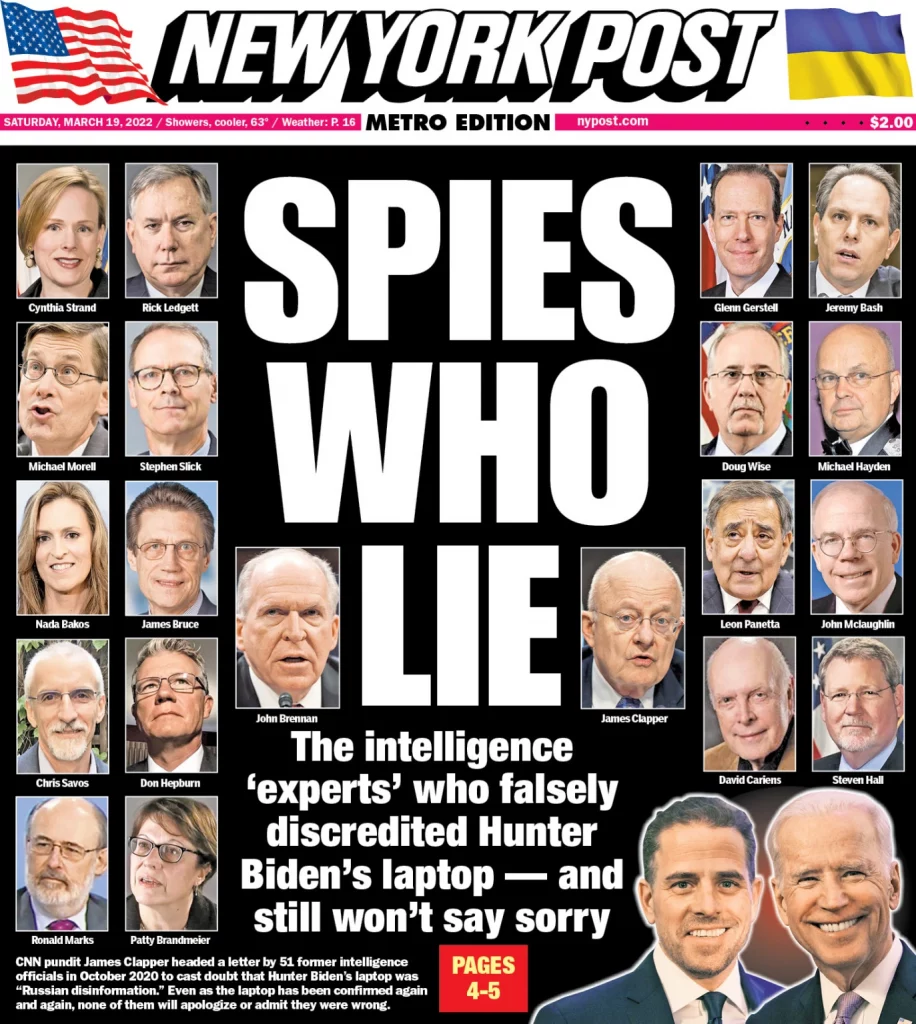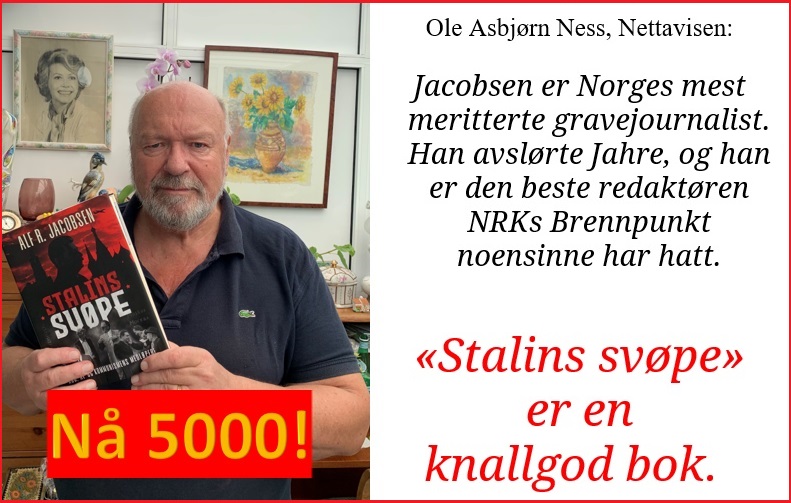
New York Post har kontaktet de 51 tidligere spionsjefene som i samlet flokk rykket ut og betegnet avsløringen av Hunter Bidens laptop som en klassisk russisk desinformasjon. De som svarer, angrer ikke. Noen ville gjort det samme om igjen og viser til Ukraina.
De hopper bukk over det avgjørende punkt: De brukte sin faglige autoritet til å spre en løgn for å få Joe Biden valgt. Det er det profesjonelle tillitsbruddet de begikk som er det mest alvorlige. De løy velgerne opp i ansiktet tre uker før valget.
Brevet ble offentliggjort i en helside i New York Times 19. oktober 2020. Politico skar gjennom forbeholdet spionsjefene pakket sitt utspill inn i.
Politico picked up the letter and ran the false headline “Hunter Biden story is Russian disinfo, dozens of former intel officials say.” That headline is still online today, even though the letter clearly says they don’t know if it’s Russian disinformation.
That headline was tweeted out by legions of Democrats, including current White House spokeswoman Jen Psaki, as proof that it was all a con. That tweet also is still up despite being proven false.
Thus pure speculation by a group of biased officials became gospel among the media. This was “fake news,” and could be safely ignored.
Arbeidsdeling
Twitter var førstemann ut: De suspenderte New York Posts konto med begrunnelsen at det dreide seg om hacket materiale. Det brukte Facebook som påskudd til å blokkere spredning av storyen, i påvente av faktasjekking som aldri fant sted. Smart.
Keep in mind that Twitter already had banned The New York Post a few days before. The rationale was that this was “hacked materials,” even though it wasn’t — and Twitter had no evidence to think it was. A Facebook official, meanwhile, said it wasn’t going to allow the sharing of The Post’s story until it was “fact checked” by a third party — a check that never happened.
Biden ble offer
De tidligere tjenestemennene gikk ikke bare god for en løgn. Det var en løgn som gjorde Biden til offer og bygget på flere års konspirasjonskampanje om at Trump var et «Russian asset». Til tross for at Mueller-rapporten ikke hadde funnet noe bevis for en slik påstand, spant spionsjefene videre på den.
Thus, Big Tech, former government officials, and the media conspired together to bury a story.
No, not just bury — create a false narrative that flipped the script to make Joe Biden the victim of a conspiracy.
Amerikanerne hadde erfart at the Deep State var en skjult makt. Brevet fra de 51 var det samme som å se Leviathan stå frem og vise sitt heslige ansikt.
Dette var ikke folkevalgte som oppkastet seg selv til politiske aktører i samarbeid med mediene. Flere av dem hadde fått godt betalte jobber i mediene, som James Clapper og John Brennan.
Mange amerikanere hadde fulgt avsløringene av hvordan de hadde systematisk motarbeidet og undergravd Trump. Nå sto operatørene frem for å få Biden valgt, til tross for alvorlige avsløringer.
Dette er en av grunnene til at 39 prosent av velgerne mener at valget i 2020 var «rigget».
New York Post har spurt alle de 51 om hvordan de stiller seg til opplysningen om at FBI nå går god for korrespondansen på Hunters laptop.
Det var New York Times som skrev dette sist uke i en oppfølging av skattesaken mot Hunter. Opplysningen var begravet langt nede i saken.
The Post reached out to those who signed the letter. Most would answer the question. A few doubled-down, including Clapper. No remorse. No shame. And no apologies:
Mike Hayden, former CIA director, now analyst for CNN: Didn’t respond.
Jim Clapper, former director of national intelligence, now CNN pundit: “Yes, I stand by the statement made AT THE TIME, and would call attention to its 5th paragraph. I think sounding such a cautionary note AT THE TIME was appropriate.”
Leon Panetta, former CIA director and defense secretary, now runs a public policy institute at California State University: Declined comment.
John Brennan, former CIA director, now analyst for NBC and MSNBC: Didn’t respond.
Thomas Fingar, former National Intelligence Council chair, now teaches at Stanford University: Didn’t respond.
Rick Ledgett, former National Security Agency deputy director, now a director at M&T Bank: Didn’t respond.
John McLaughlin, former CIA acting director, now teaches at Johns Hopkins University: Didn’t respond.
Michael Morell, former CIA acting director, now at George Mason University: Didn’t respond.
Mike Vickers, former defense undersecretary for intelligence, now on board of BAE Systems: Didn’t respond.
Doug Wise, former Defense Intelligence Agency deputy director, teaches at University of New Mexico: Didn’t respond.
Nick Rasmussen, former National Counterterrorism Center director, now executive director, Global Internet Forum to Counter Terrorism: Didn’t respond.
Russ Travers, former National Counterterrorism Center acting director: “The letter explicitly stated that we didn’t know if the emails were genuine, but that we were concerned about Russian disinformation efforts. I spent 25 years as a Soviet/Russian analyst. Given the context of what the Russians were doing at the time (and continue to do — Ukraine being just the latest example), I considered the cautionary warning to be prudent.”
Andy Liepman, former National Counterterrorism Center deputy director: “As far as I know I do [stand by the statement] but I’m kind of busy right now.”
John Moseman, former CIA chief of staff: Didn’t respond.
Larry Pfeiffer, former CIA chief of staff, now senior advisor to The Chertoff Group:
Didn’t respond.
Jeremy Bash, former CIA chief of staff, now analyst for NBC and MSNBC: Didn’t respond.
Rodney Snyder, former CIA chief of staff: Didn’t respond.
Glenn Gerstell, former National Security Agency general counsel: Didn’t respond.
David Priess, former CIA analyst and manager: “Thank you for reaching out. I have no further comment at this time.”
Pam Purcilly, former CIA deputy director of analysis: Didn’t respond.
Marc Polymeropoulos, former CIA senior operations officer: Didn’t respond.
Chris Savos, former CIA senior operations officer: Didn’t respond.
John Tullius, former CIA senior intelligence officer: Didn’t respond.
David A. Vanell, former CIA senior operations officer: Didn’t respond.
Kristin Wood, former CIA senior intelligence officer, now non-resident fellow, Harvard: Didn’t respond.
David Buckley, former CIA inspector general: Didn’t respond.
Nada Bakos, former CIA analyst and targeting officer, now senior fellow, Foreign Policy Research Institute: Didn’t respond.
Patty Brandmaier, former CIA senior intelligence officer: Didn’t respond.
James B. Bruce, former CIA senior intelligence office: Didn’t respond.
David Cariens, former CIA intelligence analyst: Didn’t respond.
Janice Cariens, former CIA operational support officer: Didn’t respond.
Paul Kolbe, former CIA senior operations officer: Didn’t respond.
Peter Corsell, former CIA analyst: Didn’t respond.
Brett Davis, former CIA senior intelligence officer: Didn’t respond.
Roger Zane George, former national intelligence officer: Didn’t respond.
Steven L. Hall, former CIA senior intelligence officer: Didn’t respond.
Kent Harrington, former national intelligence officer: Didn’t respond.
Don Hepburn, former national security executive, now president of Boanerges Solutions LLC: “My position has not changed any. I believe the Russians made a huge effort to alter the course of the election . . . The Russians are masters of blending truth and fiction and making something feel incredibly real when it’s not. Nothing I have seen really changes my opinion. I can’t tell you what part is real and what part is fake, but the thesis still stands for me, that it was a media influence hit job.”
Timothy D. Kilbourn, former dean of CIA’s Kent School of Intelligence Analysis: Didn’t respond.
Ron Marks, former CIA officer: Didn’t respond.
Jonna Hiestand Mendez, former CIA technical operations officer, now on board of the International Spy Museum: “I don’t have any comment. I would need a little more information.”
Emile Nakhleh, former director of CIA’s Political Islam Strategic Analysis Program, now at University of New Mexico: “I have not seen any information since then that would alter the decision behind signing the letter. That’s all I can go into. The whole issue was highly politicized and I don’t want to deal with that. I still stand by that letter.”
Gerald A. O’Shea, former CIA senior operations officer: Didn’t respond.
Nick Shapiro, former CIA deputy chief of staff and senior adviser to the director: Didn’t respond.
John Sipher, former CIA senior operations officer: Declined to comment.
Stephen Slick, former National Security Council senior director for intelligence programs:
Didn’t respond.
Cynthia Strand, former CIA deputy assistant director for global issues: Didn’t respond.
Greg Tarbell, former CIA deputy executive director: Didn’t respond.
David Terry, former National Intelligence Collection Board chairman: Couldn’t be reached.
Greg Treverton, former National Intelligence Council chair, now senior adviser at the Center for Strategic and International Studies: “I’ll pass. I haven’t followed the case recently.”
Winston Wiley, former CIA director of analysis: Couldn’t be reached.
Bestill gode bøker fra Document forlag:
Kjøp Alf R. Jacobsens politiske bombe «Stalins svøpe: KGB, AP og kommunismens medløpere» her!

Kjøp «Et vaklende Europa» av Carl Schiøtz Wibye her!


Vi setter stor pris på et bidrag til vårt arbeid, bruk Vipps eller konto:







